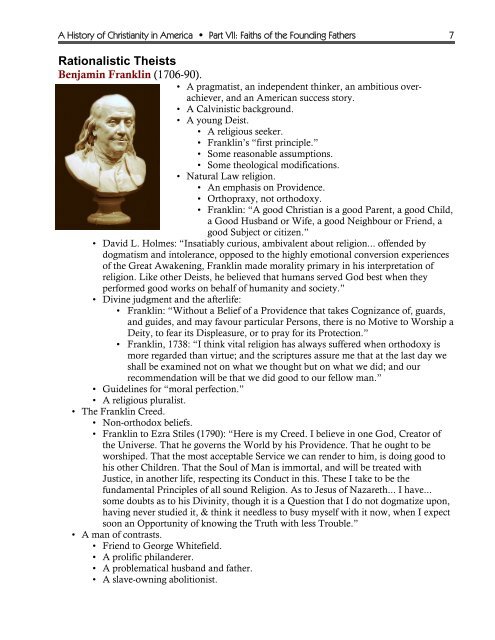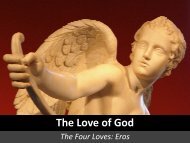7 Faiths of the Founding Fathers - Perimeter Church
7 Faiths of the Founding Fathers - Perimeter Church
7 Faiths of the Founding Fathers - Perimeter Church
You also want an ePaper? Increase the reach of your titles
YUMPU automatically turns print PDFs into web optimized ePapers that Google loves.
A History <strong>of</strong> Christianity in America • Part VII: <strong>Faiths</strong> <strong>of</strong> <strong>the</strong> <strong>Founding</strong> Fa<strong>the</strong>rs 7Rationalistic TheistsBenjamin Franklin (1706-90).• A pragmatist, an independent thinker, an ambitious overachiever,and an American success story.• A Calvinistic background.• A young Deist.• A religious seeker.• Franklin’s “first principle.”• Some reasonable assumptions.• Some <strong>the</strong>ological modifications.• Natural Law religion.• An emphasis on Providence.• Orthopraxy, not orthodoxy.• Franklin: “A good Christian is a good Parent, a good Child,a Good Husband or Wife, a good Neighbour or Friend, agood Subject or citizen.”• David L. Holmes: “Insatiably curious, ambivalent about religion... <strong>of</strong>fended bydogmatism and intolerance, opposed to <strong>the</strong> highly emotional conversion experiences<strong>of</strong> <strong>the</strong> Great Awakening, Franklin made morality primary in his interpretation <strong>of</strong>religion. Like o<strong>the</strong>r Deists, he believed that humans served God best when <strong>the</strong>yperformed good works on behalf <strong>of</strong> humanity and society.”• Divine judgment and <strong>the</strong> afterlife:• Franklin: “Without a Belief <strong>of</strong> a Providence that takes Cognizance <strong>of</strong>, guards,and guides, and may favour particular Persons, <strong>the</strong>re is no Motive to Worship aDeity, to fear its Displeasure, or to pray for its Protection.”• Franklin, 1738: “I think vital religion has always suffered when orthodoxy ismore regarded than virtue; and <strong>the</strong> scriptures assure me that at <strong>the</strong> last day weshall be examined not on what we thought but on what we did; and ourrecommendation will be that we did good to our fellow man.”• Guidelines for “moral perfection.”• A religious pluralist.• The Franklin Creed.• Non-orthodox beliefs.• Franklin to Ezra Stiles (1790): “Here is my Creed. I believe in one God, Creator <strong>of</strong><strong>the</strong> Universe. That he governs <strong>the</strong> World by his Providence. That he ought to beworshiped. That <strong>the</strong> most acceptable Service we can render to him, is doing good tohis o<strong>the</strong>r Children. That <strong>the</strong> Soul <strong>of</strong> Man is immortal, and will be treated withJustice, in ano<strong>the</strong>r life, respecting its Conduct in this. These I take to be <strong>the</strong>fundamental Principles <strong>of</strong> all sound Religion. As to Jesus <strong>of</strong> Nazareth... I have...some doubts as to his Divinity, though it is a Question that I do not dogmatize upon,having never studied it, & think it needless to busy myself with it now, when I expectsoon an Opportunity <strong>of</strong> knowing <strong>the</strong> Truth with less Trouble.”• A man <strong>of</strong> contrasts.• Friend to George Whitefield.• A prolific philanderer.• A problematical husband and fa<strong>the</strong>r.• A slave-owning abolitionist.



